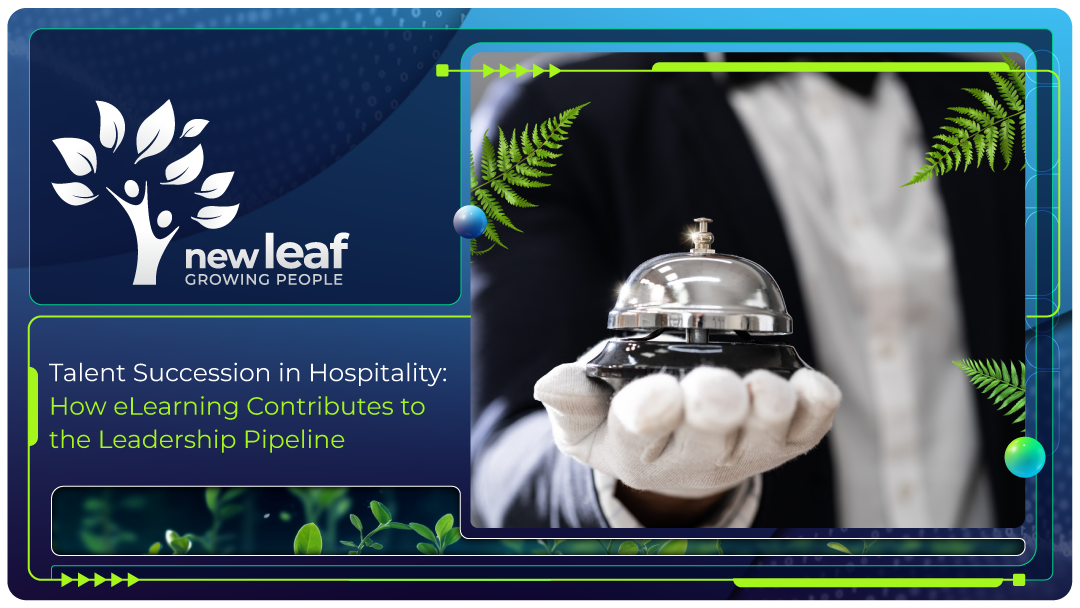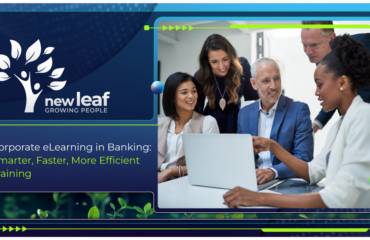
Hospitality thrives on people. Whether it’s a hotel manager resolving a guest issue at midnight, a restaurant supervisor ensuring consistency across service teams, or a resort executive setting long-term strategy, leadership makes the difference between a memorable stay and a disappointing one. Yet the industry faces one of its greatest challenges: how to develop and sustain a pipeline of future leaders.
5 Key Takeaways
- Hospitality faces high turnover and skills shortages, making structured succession planning a business-critical priority.
- Traditional approaches to leadership development often fall short, relying too heavily on external hires or quick promotions that can dilute culture and weaken service consistency.
- eLearning provides scalable, flexible, and personalised leadership pathways, equipping staff from entry level to management with the skills they need.
- Effective leadership training combines scenario-based learning modules, mentorship, multilingual access, and mobile-friendly platforms to meet hospitality’s unique needs.
- Investing in internal growth strengthens culture, enhances retention, and improves service standards, thereby building a sustainable leadership pipeline for the hospitality industry.

Why Succession Planning Is Crucial in Hospitality
Hospitality is fast-moving, people-centred, and service-driven. Leadership gaps have direct consequences on both guest satisfaction and financial performance. Here’s what most hospitality businesses are facing:
- High turnover is the norm. Deloitte Hospitality Insights found that hotel turnover rates can reach nearly double those of other industries. Such frequent exits increase recruiting, training, and onboarding costs. They also erode institutional memory, which is the secret to guest satisfaction, brand standards, and operational efficiency.
- Skills shortages are growing. As guest expectations rise and operations become more complex (with digital technologies, sustainability, and personalised service, among others), the demand for leaders who can manage across disciplines increases. Yet many hospitality firms struggle to find internal talent ready to step up. This shortage is particularly acute when relying on external hiring to fill leadership gaps, as external hires are costly, time-consuming to ramp up, and may not fully understand the brand’s culture or service DNA.
- Stability and culture drive long-term value. For hospitality businesses, consistency in guest experience is central. Ensuring that service standards, guest relations, and crisis management are maintained across staff changes depends on leadership that understands both the brand’s core values and local operational realities. When leaders are developed internally, they are more likely to preserve culture, anticipate guest needs, and navigate shocks (economic, public health, competitive) with agility.
- Financial impact is significant. Because a large portion of hotel costs is labour-related (for example, in Deloitte’s analysis, labour can account for 45% of operating expenses and 33% of revenues), turnover and leadership gaps directly impact profitability. Continuity in leadership through succession planning and internal promotions reduces the costs that come with external hiring. It also mitigates productivity drops and preserves knowledge that would otherwise be lost.
- Strategic adaptation in changing environments. Rising technology adoption, changing guest expectations, and workforce mobility all contribute to a fast-paced operating environment. To address the issue of staff development in hotels, hospitality organisations need leaders who can respond to disruption, innovate, and align across multiple functions. A proactive succession plan ensures that there is a bench of people prepared for future needs, not only current ones. McKinsey’s The Art of 21st-Century Leadership: From Succession Planning to Building a Leadership Factory makes precisely this point. Successful organisations treat leadership development as a core capability.
The Traditional Gaps in Hospitality Talent Development
Even when hospitality businesses recognise the need for leadership development, there are several recurring gaps in how they approach it:
- Reliance on Quick Promotions or External Hires
Often, rising stars or long‐standing employees are promoted quickly, sometimes based on seniority or charisma rather than demonstrated leadership skills. External hires may also be brought in to fill leadership gaps. Both these decisions carry risks: Promoted employees may not be fully prepared for their new roles, and external hires may struggle to adapt to the company’s culture, values, and service norms. - Insufficient Structured Development
Traditional approaches may include ad hoc training, orientation, occasional workshops, and mentoring (if available). What’s often missing is a structured, multi-year leadership development pipeline that provides stretch assignments, cross-functional exposure, coaching, and feedback. McKinsey’s research suggests that in many companies, succession planning remains reactive and is often triggered by a departure rather than being planned in advance. - Knowledge Gaps and Loss of Institutional Memory
When leaders leave (voluntarily or otherwise) without a well-developed successor, important tacit knowledge, such as how to respond in local crises, best practices for guest relations, and brand values in action, is lost. This can lead to a rise in errors, inconsistent service, and customer dissatisfaction. - Cultural Dilution and Brand Inconsistency
When leadership is patched together from external recruits or rapid promotions without embedding company values, there can be drift in culture. Staff at all levels may start behaving differently, and guests may notice inconsistency in service standards. Over time, this undermines brand trust. - Bias & Narrow Selection Criteria
According to McKinsey’s Bias Busters: Next in Line? A Structured Approach to Succession Planning, many organisations unconsciously favour candidates who are similar to current leaders (in style, background, and identity), rather than based on future strategic needs. This similarity bias can skew the leadership pipeline, making it less adaptable to change.
How eLearning Builds a Stronger Leadership Pipeline in Hospitality
eLearning (and digital blended learning) can address many of those gaps that affect hospitality talent succession. Here’s how:
- Scalability & Reach
Hospitality operations are 24/7, often with multiple locations and languages. eLearning in hotels allows staff across geographies and time zones to access training modules whenever they can. This reduces the delay caused by waiting for in-person workshops, making learning inclusive and accessible. - Continuous & On-Demand Learning Paths
Rather than periodic training, eLearning supports ongoing skill development. For example, employees can move along a defined leadership pathway from entry level to supervisor to manager, with personalised modules tailored to each level or learner. This allows people to self-pace, revisit content, and apply lessons as they move into new roles. - Customisation and Personalisation
Digital platforms can adapt to the learner, whether via assessments that highlight gaps (e.g., leadership style, communication, conflict resolution) or via personalised recommendations (courses, microlearning, video cases). Personalised learning makes all the difference as it reduces wasted content (no “one-size-fits‐all”) and boosts engagement. - Scenario-Based/Simulated Learning
Hospitality is full of guest-facing situations, service failures, crisis scenarios, and more. eLearning modules, including scenario-based simulations, role-plays, virtual reality (VR), or interactive case studies, allow learners to practise handling situations in a safe environment. This strengthens decision-making and judgment before crises occur in real life. - Data & Feedback Loops
Digital platforms track progress, providing interactive assessments, dashboards, and feedback. This allows L&D and training staff to identify gaps in knowledge or performance and intervene early (e.g., through coaching or stretch assignments). - Cost-Efficiency & Operational Flexibility
Although some upfront cost is required (platforms, content creation), eLearning reduces travel, venue, and instructor expenses. Its flexibility also reduces downtime or disruption to operations. - Bridging Generational & Technological Expectations
Newer staff expect more digital engagement, flexible learning, mobile access, and bite-sized content. eLearning meets these expectations, making internal development more attractive than looking elsewhere for new hires.
Case Study: City Lodge’s Approach to Nurturing Talent
City Lodge Hotels has long recognised that its people are its greatest asset. With a workforce spread across more than 150 hotels, the group invests heavily in employee development to ensure service excellence, operational efficiency, and a strong leadership pipeline.
According to the City Lodge Human Capital Report, leaders are primarily developed within the group. Attracting and retaining top talent is crucial to developing a sustainable pipeline of leaders for the future. Their approach is evidently working, as the group’s employee turnover rate of 5.5% is significantly lower than the industry average.
To achieve its leadership goals, City Lodge partnered with New Leaf Technologies to centralise and scale its learning and development function. They needed a flexible, cost-effective solution that could deliver consistent training across geographies while lightening the administrative load on their small L&D (learning & development) team.
Through the aNewSpring (LXP) Learning Experience Platform, seamlessly integrated with City Lodge’s HR systems, the hotel group deployed more than 150 internal learning programs alongside 600+ ready-made courses. Training focused on customer service excellence, compliance, operational skills, digital literacy, and hotel leadership development. Staff could access personalised content anytime, on any device, which is a game-changer for a 24/7 industry.
The results have been striking:
- Over 26,000 training activities completed.
- Access to over 600 ready-made soft skills and cybersecurity course titles provided by New Leaf Technologies.
- 91% completion rate across all programs.
- 89.6% average assessment scores.
- Entire training function managed by a single L&D professional, thanks to automation and smart reporting.
As Shirree Snyman, Group Training Manager, puts it: “New Leaf has made my job so much easier. Their dedicated support and excellent service have not only reduced our training cost but also made learning work. The staff really enjoy the new system; it’s made all the difference.”
City Lodge now has a robust, efficient, and measurable approach to talent development and their hospitality talent succession programs. The result is that staff are continuously upskilled and equipped to step into leadership roles with confidence. Online training, combined with learnerships, work-integrated learning, and access to internationally recognised City and Guilds courses, positions the group as a model example of how eLearning can strengthen succession planning in hotels.
Paul Hanly, Co-Founder of New Leaf Technologies, says: “We see the aNewspring learning platform creating huge value for the City Lodge Hotel Group. They can accurately measure employee development and ensure they are progressing as planned. Any difficulties in the learning process are also highlighted early so that the necessary changes can be made.”
Key Features of Effective Hospitality Leadership Training
What makes digital learning for hospitality teams truly effective? Below are essential features of hospitality training programs, with examples where relevant:
| Feature | Why It Matters in Hospitality | Best Practices/Examples |
| Scenario-based Learning | To prepare leaders for guest service issues, crises, conflicts, cross-cultural expectations, etc., simulations allow risk-free practice. | Use guest complaint role-plays, ethics dilemmas, emergency response, and cross-cultural service simulations. Incorporate VR or AR where possible. |
| Cross-department Modules | Hospitality is not siloed. Leaders often need exposure to different units (front office, F&B, housekeeping, operations, finance) to understand the whole customer journey. | Rotations, shadowing, and modules that take learners through “a day in the life” of different departments. |
| Mentorship & Coaching Integration | Digital alone is rarely enough for leadership growth; human guidance helps apply theory to context, navigate organisational politics, and build confidence. | Pair emerging leaders with seasoned ones; incorporate coaching sessions; feedback loops tied to digital content. |
| Multilingual Access | The hospitality workforce is often multilingual, and the same is true for guests. Training in only a single language limits reach and comprehension. | Offer content in multiple languages and with subtitles; ensure examples/cases are locally relevant. |
| Mobile-Friendly Platforms | Staff on the move, off hours, or in field roles (housekeeping, kitchen, maintenance) need access to phones and tablets. Training during downtime (before shift, breaks) must be feasible. | Platforms with responsive design, micro-learning modules, push-notifications, and offline access when connectivity is limited. |
| Personalised Learning Paths | Not everyone is building the same leadership skills; some need people management, some financial acumen, some tech or digital literacy. A “leadership pipeline” benefits from varied tracks. | Assessments to map current competencies, followed by tailored module recommendations, elective tracks, and stretch assignments. |
| Real-Time / Ongoing Assessment & Analytics | To monitor effectiveness, identify who is progressing, who is lagging, what topics are weak, etc. In hospitality, small inefficiencies can have a big impact on guest experience or cost. | Dashboards for HR/leaders; regular check-ins; also learner feedback; adapt content based on observed needs. |
| Cultural & Service Excellence Embedded | Leadership in hospitality is more than management skills. Guest satisfaction, brand values, and service consistency are core, especially in luxury or premium segments. | Training modules that emphasise culture, ethics, brand standards, storytelling, testimonials, and employee value proposition. |
Long-Term Payoff of Investing in Internal Growth
Developing leaders from within is about future-proofing the business.
The benefits compound:
- Improved retention and engagement. Clear career pathways and development investment encourage staff loyalty, reducing costly turnover.
- Cultural continuity. Leaders trained internally preserve and transmit organisational values, strengthening cohesion across locations.
- Consistent service standards. With well-prepared leaders in place, guest experiences remain reliable even in times of disruption.
- Reduced risk. A ready bench of talent mitigates business disruption when leaders leave.
- Greater adaptability. Ongoing leadership development equips organisations to embrace digital change, sustainability, and new guest expectations.
- Financial returns. Lower recruitment costs, fewer service disruptions, and improved guest loyalty all contribute to stronger bottom-line performance.
As McKinsey notes, leadership development is a competitive advantage when treated as a systematic capability.
Build Your Next Generation of Hospitality Leaders
Succession planning in hospitality is no longer optional. To stay competitive, organisations must:
- Identify high-potential talent early.
- Build structured, bias-aware succession systems.
- Implement scalable, flexible training through eLearning platforms.
- Combine digital training with mentorship and cultural reinforcement.
At New Leaf Technologies, we help hospitality organisations design eLearning solutions that align with their leadership goals. From scenario-based modules to multilingual, mobile-ready platforms, our tools equip your staff to step confidently into leadership roles.
Ready to strengthen your leadership pipeline? Get in touch with New Leaf Technologies and start building the next generation of hospitality leaders today.
FAQ
Why is succession planning such a challenge in the hospitality industry?
Hospitality faces some of the highest staff turnover rates worldwide. Without a structured succession pipeline, businesses risk service inconsistency and rising recruitment costs. Scalable, customised eLearning equips employees at all levels with the skills and leadership capabilities needed to step into future roles.
How can eLearning improve leadership development compared to traditional training?
Traditional classroom training is costly, time-consuming, and hard to scale across a diverse, geographically spread workforce. eLearning offers flexible, on-demand training, ensuring that staff learn in a way that fits their schedule while creating a centralised platform for consistent, measurable results.
What impact can eLearning have on employee engagement and retention in hospitality?
Employees who feel valued are far more likely to stay, grow, and deliver excellent guest experiences. Personalised learning pathways, leadership development opportunities, and real-time feedback secure the talent pipeline and improve profitability.




